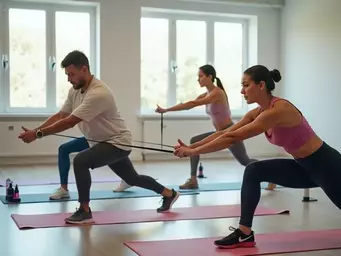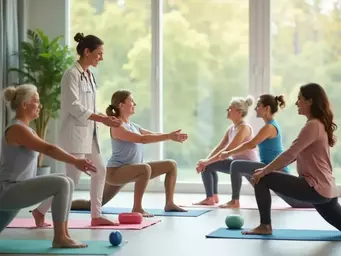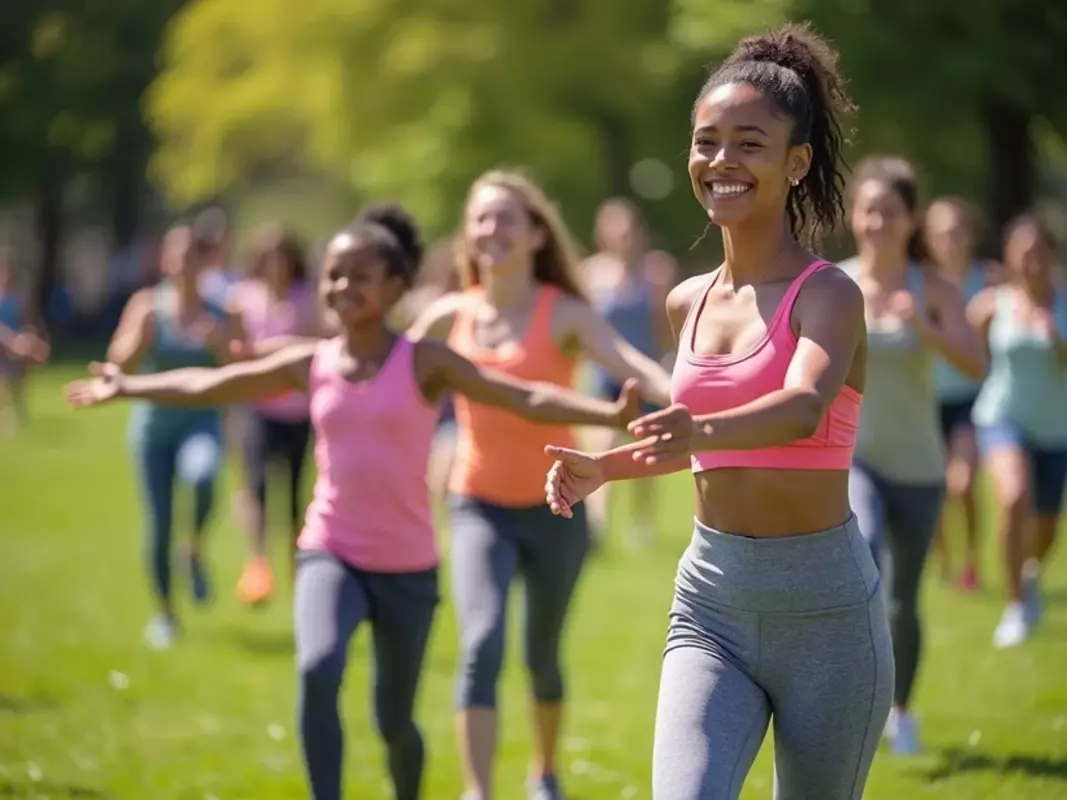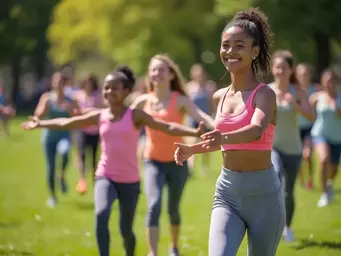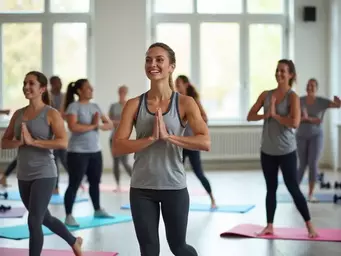Exercise Programs for NDIS Participants

What if you could transform your life with simple movements? For individuals with physical disabilities, the journey toward a healthier lifestyle begins here. The National Disability Insurance Scheme (NDIS) paves the way for tailored exercise programs that can empower and uplift. Let’s explore the valuable insights you’ll gain from understanding these essential components!
What You Will Learn
- The NDIS provides personalized funding and support for individuals with disabilities to access tailored exercise programs, improving health and well-being.
- Engaging in regular physical activity enhances mental health, mobility, and independence, leading to an overall better quality of life.
- Exercise Physiologists play a crucial role in developing individualized plans that address specific challenges faced by participants.
- Emerging technologies, such as telehealth and wearable devices, are revolutionizing access to exercise programs, making them more inclusive and convenient.
- Future trends in NDIS exercise services emphasize holistic approaches that integrate physical fitness with mental health and community engagement.
- Understanding eligibility criteria and connecting with accredited exercise providers is essential for navigating NDIS exercise funding effectively.
Benefits of Regular Physical Activity on Mental Health and Wellbeing
Engaging in regular exercise offers numerous benefits, particularly for mental health and emotional well-being. Here are some key advantages:
Reduces Symptoms of Anxiety and Depression
Regular exercise can significantly lower anxiety levels and depressive symptoms, contributing to improved mental health.
Enhances Mood and Overall Emotional Health
Engaging in physical activity leads to the release of endorphins, which boosts mood and fosters emotional well-being.
Promotes Better Sleep Patterns
Regular workouts can help you fall asleep faster and deepen your sleep, improving overall restfulness.
Boosts Self-Esteem and Confidence
Engaging in regular exercise can improve body image and self-perception, enhancing self-esteem and confidence.
Understanding NDIS Exercise Programs for Individuals with Physical Disabilities
As we dive into the world of NDIS exercise programs for individuals with physical disabilities, it’s important to grasp the foundational elements of the National Disability Insurance Scheme (NDIS). This scheme plays a vital role in supporting disability services across Australia, ensuring that participants receive the assistance they need to lead fulfilling lives. At Health Moves, we understand firsthand how complex this system can be, and our mission is to make it more accessible for families navigating these waters. For a deeper understanding, consider exploring NDIS and exercise physiology insights.
Defining the NDIS and Its Role in Supporting Disability Services
The NDIS is designed to provide funding and support to individuals with disabilities, helping them access the resources necessary for achieving their goals. This may include funding for exercise physiology services, allowing participants to engage in tailored movement programs. By integrating exercise into their lives, participants can work towards enhancing their overall well-being.
Overview of the National Disability Insurance Scheme (NDIS)
Launched in 2013, the NDIS aims to transform the way disability services are funded and delivered in Australia. The scheme focuses on providing individualized support based on each person's unique needs and circumstances. With the NDIS, participants can create personalized plans that outline their goals, including health and fitness objectives.
Through the NDIS, individuals can access a variety of supports, including:
- Therapeutic support services
- Assistive technology
- Community participation opportunities
- Funded exercise physiology sessions
How NDIS Supports Exercise Physiology for Disabilities
Exercise physiology is a cornerstone of many NDIS plans, providing essential support for individuals with physical disabilities. Exercise Physiologists (EPs) play a crucial role in delivering these tailored programs, designed to enhance physical function and overall health. At Health Moves, we focus on creating programs that not only meet NDIS requirements but also resonate deeply with the participants' lived experiences, such as those discussed in Exercise Physiologists in NDIS Explained.
By leveraging the NDIS, participants can access:
- Individualized exercise plans
- Goal-oriented training sessions
- Supportive environments to foster growth
The Significance of Exercise for People with Physical Disabilities
Exercise is not just about physical fitness; it’s about enhancing quality of life. For people with physical disabilities, regular physical activity is vital for mental health, mobility, and independence. At Health Moves, we know that every movement counts, and we’re here to guide you through the process.
Benefits of Regular Physical Activity on Mental Health and Wellbeing
Engaging in regular exercise offers numerous benefits, particularly for mental health and emotional well-being. Here are some key advantages:
- Reduces symptoms of anxiety and depression
- Enhances mood and overall emotional health
- Promotes better sleep patterns
- Boosts self-esteem and confidence
Improving Mobility and Independence through Tailored Exercise
One of the most significant benefits of tailored exercise programs is the improvement in mobility and independence. By working with an Exercise Physiologist, individuals can develop personalized plans that address their specific challenges. Imagine how empowering it feels to regain the ability to perform everyday tasks with ease! For more on developing effective programs, check out our guide on building movement programs for disabilities.
- Enhancing muscular strength
- Improving balance and coordination
- Increasing endurance for daily activities
Understanding the Role of Occupational Therapy in Exercise Programs
Occupational therapy complements exercise physiology by focusing on the skills needed for daily living. Together, these two disciplines create a holistic approach that empowers individuals to achieve their goals. An Occupational Therapist (OT) can collaborate with an Exercise Physiologist to ensure that movement programs align with daily living needs.
In summary, the NDIS and tailored exercise programs offer a pathway to greater independence and improved quality of life for individuals with physical disabilities. As we continue this journey together, remember that Health Moves is here to support you every step of the way! Let’s unlock the power of movement in your life.
Quick Summary
Here's a brief recap of the key points discussed so far:
- The NDIS provides essential funding and support for individuals with disabilities to access tailored exercise programs.
- Regular physical activity significantly enhances mental health, mobility, and overall quality of life for individuals with physical disabilities.
- Exercise physiology, combined with occupational therapy, offers a holistic approach to improving daily living skills and independence.
Emerging Trends and Innovations in NDIS Exercise Programs
The world of exercise and rehabilitation is changing rapidly, and the NDIS is keeping pace with these exciting trends. As an Exercise Physiologist at Health Moves, I’ve witnessed how technology is reshaping the way we deliver support to individuals with disabilities. From virtual programs to wearable tech, these innovations make exercise more accessible and engaging than ever before!
These advancements are significant because they allow more people to participate in exercise programs that suit their unique needs. It’s all about creating opportunities for everyone, and I’m thrilled to see the positive impact of these trends on our community. Let’s explore some of the most notable innovations in the NDIS landscape!
Technology in Exercise Support: Telehealth and Digital Tools
One of the most notable changes in the exercise physiology field is the rise of telehealth and digital tools. These advancements have made it easier for participants to access their programs from the comfort of home. Here are some key components of this trend:
- Virtual Exercise Programs: Many providers now offer online classes that participants can join from home. This format allows for greater flexibility and convenience.
- Wearable Technology: Devices such as fitness trackers help monitor progress and provide valuable feedback to both participants and their exercise physiologists.
- Remote Exercise Programs: These allow for personalized support without needing to attend in-person sessions, making it easier for individuals with mobility challenges to engage in physical activity.
At Health Moves, we embrace these technologies to ensure our participants can benefit from tailored exercise programs. The convenience and accessibility of digital tools are essential in promoting a more active and engaged lifestyle!
Future Directions for NDIS Exercise Services
The landscape of NDIS exercise services is continuously evolving, with a focus on integrating new therapies and innovative practices. As an advocate for holistic approaches, I truly believe that the future of exercise physiology lies in these interconnected methods. Here are some promising directions we may see in the near future:
- Integrating New Therapies: Combining traditional exercise programs with alternative therapies, such as yoga or mindfulness, can enhance overall well-being.
- Promoting Holistic Approaches: This entails considering not just physical fitness but also mental health and social connections as vital components of fitness programs.
- Inclusive Fitness: Breaking barriers to community engagement ensures that all individuals feel welcome and supported in their fitness journeys.
As we move forward, my goal at Health Moves is to help individuals with disabilities access these innovative services and create more empowering experiences in their exercise programs!
Frequently Asked Questions About NDIS Exercise Programs
When exploring NDIS exercise programs, many questions might arise. Understanding the ins and outs of eligibility and funding can feel overwhelming, but I’m here to help you navigate through it! Here are some common inquiries that might be on your mind:
Common Inquiries About NDIS Funding and Eligibility
One of the most frequently asked questions I encounter is about eligibility for exercise programs under the NDIS. To determine if you qualify, it’s essential to consider the following:
- Age and Disability: You must be under 65 and have a permanent disability that impacts your ability to engage in daily activities.
- NDIS Plan Requirements: Your NDIS plan must include funding for exercise physiology services.
- Assessment Process: An assessment will confirm your needs and help integrate exercise programs into your overall plan.
Understanding these factors is crucial in taking the first steps toward accessing the support you need!
Connecting with Providers and Resources
Another important aspect is connecting with the right providers, especially accredited exercise physiologists. Here are some tips on how to find the support you need:
- Search for Accredited Providers: Use the NDIS website to find registered Exercise Physiologists near you.
- Contacting NDIS: Reach out to the NDIS hotline or visit their website for further information on available resources.
Building a connection with a qualified professional can make all the difference in your exercise journey. At Health Moves, we’re dedicated to guiding you towards the right resources and creating a supportive environment for your fitness goals!
FAQs About NDIS Exercise Programs
Here are some frequently asked questions to help clarify the main points about NDIS exercise programs:
- What is the NDIS and how does it support exercise programs?
The NDIS (National Disability Insurance Scheme) provides funding and support for individuals with disabilities to access tailored exercise programs, enhancing their health and well-being. It helps participants create personalized plans that include therapeutic supports like exercise physiology. - What are the benefits of regular physical activity for individuals with physical disabilities under the NDIS?
Regular physical activity enhances mental health by reducing anxiety and depression, improves mood, promotes better sleep, and boosts self-esteem. It also significantly improves mobility and independence through tailored exercise plans that increase muscular strength, balance, coordination, and endurance. - What role do Exercise Physiologists play in NDIS exercise programs?
Exercise Physiologists (EPs) are crucial in developing individualized exercise plans tailored to the specific challenges and goals of NDIS participants. They help enhance physical function and overall health, ensuring programs meet NDIS requirements and are effective. - How are emerging technologies impacting NDIS exercise services?
Emerging technologies like telehealth and wearable devices are revolutionizing access to exercise programs. Virtual exercise programs and remote support make physical activity more convenient and inclusive, especially for individuals with mobility challenges, allowing them to participate from home and track progress effectively. - How can I access NDIS exercise funding and connect with accredited providers?
To access funding, you must be under 65, have a permanent disability, and your NDIS plan must include funding for exercise physiology services. You can connect with accredited providers by searching the NDIS website for registered Exercise Physiologists or contacting the NDIS hotline for information on available resources.
Taking the Next Step Towards a Healthier Lifestyle with NDIS
Taking the first step towards a healthier lifestyle can be daunting, but knowing that support is available makes it more manageable! Understanding the importance of starting your exercise journey is essential. Remember, progress comes one step at a time! For guidance on reporting for your NDIS plan, explore our guide to NDIS functional reports.
Encouraging Engagement and Action
If you’re ready to embark on this journey, I encourage you to consult an accredited provider today. Having a supportive professional by your side can empower you to reach your goals and maximize your potential. Together, we can create a brighter, healthier future for individuals with disabilities!
Recap of Key Points
Here is a quick recap of the important points discussed in the article:
- The NDIS provides essential funding and support for individuals with disabilities, facilitating personalized exercise programs to enhance well-being.
- Engaging in regular exercise significantly benefits mental health, mobility, and independence for people with physical disabilities.
- Exercise physiologists play a key role in developing individualized plans that focus on physical function and overall health.
- Emerging technologies, such as telehealth and wearable devices, are making exercise programs more accessible and engaging.
- Future NDIS exercise services may integrate new therapies and promote holistic approaches to fitness, including mental health and community engagement.
- Understanding NDIS eligibility and connecting with accredited providers are crucial steps in accessing the support needed for a healthier lifestyle.

